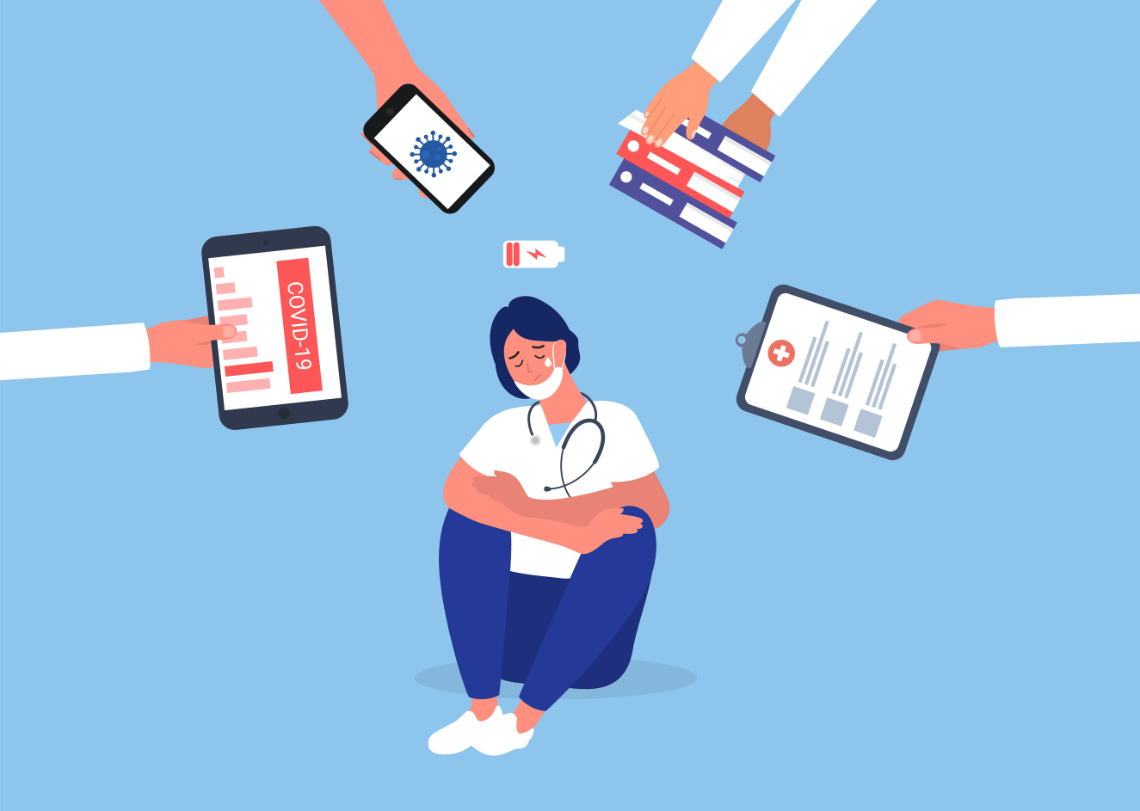Avoiding Burnout in Nursing
Burnout is a common consequence of working in a high-stress, fast-paced environment, especially in the healthcare industry. Nursing is a highly demanding and challenging profession and thus nurses become highly susceptible to burnout. If you have spent any time working in a healthcare setting, you're likely familiar with the term "burnout." Everyone dreads this word and its consequences - reduced productivity and an overall lowered work output as a result of emotional and physical exhaustion.
In the year 2019, "burnout" was included in the World Health Organization's International Classification of Diseases as the prevalence of burnout in the healthcare industry skyrocketed. In fact, according to a recent survey done by the American Nurses Association, the number of reported burnout cases amongst nurses had risen close to 62%. Aside from causing frustration, burnout also has serious implications on personal health and relationships outside of the work environment. Therefore, it is crucial for nurses to find a solution to burnout via various techniques, including rest, relaxation techniques, diet, and workplace stress management techniques.
Signs and Symptoms of Burnout
If you're experiencing any of the following, it is a good indication that you might be experiencing burnout.
- Feelings of disappointment and anger - especially when you expected to be performing better than you are
- Irritability, mood swings, and even anger outbursts
- Difficulty sleeping and/or sleeping more than usual
- Feeling exhausted, as if you have no energy to do anything
- Lack of motivation or interest in activities that usually bring you joy
- Being easily overwhelmed by daily tasks
- A sense of hopelessness or cynicism about your future
- Feelings of guilt, shame, or humiliation about your work or profession
- Suicidal thoughts and/or behavior
- Feeling overstretched, too busy, etc.
- Physical and/or emotional pain, aches, and fatigue
You may also want to take a break and take care of your mental and physical health.
Rest and Relaxation
It is important to take breaks from work, both physically and mentally, to avoid burnout. However, taking a break from work to relax and recuperate should be the norm, not the exception. Many nurses report taking vacations as one of the best ways to "reset" after a burnout episode. While on vacation, it is important to make sure you maintain a healthy diet and get adequate rest. It is also important to consider the healthcare needs of your family and loved ones while on vacation. If you find you are struggling with burnout during your vacation, it may be a good idea to take a few days off to recover.
Healthy Diet and Movement

When experiencing burnout, it is important to maintain a healthy diet, get plenty of rest and engage in some form of physical activity. A healthy diet is important for keeping your energy levels up and for reducing inflammation. A healthy diet should be one that is rich in fresh fruits and vegetables, healthy proteins, whole grains, legumes, and nuts while avoiding processed foods, highly refined carbohydrates, and sugary drinks. It is also important not to skip meals and to drink water throughout the day to stay hydrated. Maintaining a healthy diet while experiencing burnout can be difficult. Maintaining a healthy diet can be even more challenging if you are also experiencing stress. The key is finding a way to maintain your healthy diet while also managing your stress levels. One way to do this is to turn your focus to meal planning and prioritize eating a healthy diet during times of high stress. You may also want to consider talking to your supervisor about the possibility of taking a leave of absence to recover from burnout and to allow you to maintain your healthy diet and engage in some form of physical activity during this time.
Self-Care Routines
Creating and implementing routines that will allow you to feel better when you experience burnout is important. One of the first things you want to do is to create a "recharge" routine. A recharge routine is designed to help you to reset and re-energize after a long day of work. It can be as simple as taking a nap, reading a book, listening to your favorite music, or simply taking time out to relax and unwind. When you are taking a break from work, it is important to make sure you are taking regular breaks, getting enough rest, and eating a healthy diet. A recharge routine is done during non-work hours, such as during your lunch break, after work, while relaxing in your car, or at home while watching a movie or reading a book. When taking time out of work to relax and recharge, it is important to remember to make the most out of your break.
Workplace Stress Management

It is important to keep in mind that the best way to prevent burnout is to prevent it from happening in the first place. There are many ways to prevent burnout, but the most effective way is to implement workplace stress management techniques. Workplace stress management techniques include:
- Having a healthy work-life balance
- Taking regular breaks
- Maintaining a positive outlook on your job
- Having realistic expectations
- Seeking support from your supervisor and coworkers
- Being accountable for your actions
There are many ways that workplace stress management can be implemented in the nursing profession. For example, nurse managers can implement workplace stress management techniques by creating a culture of support and accountability and having regular meetings where employees can share their concerns and receive advice and support.






